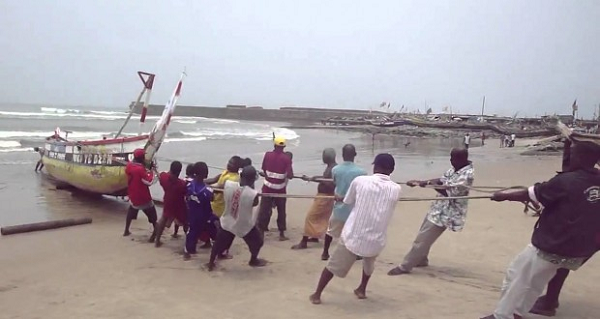
The tide rages; a community seeks safety
The catches are low for fishermen in fisher communities.
Their livelihoods are threatened.Even more threatening are the rage of the sea waves on some of these communities.
Advertisement
Anlo beach is a beautiful coastal community in the Western region of Ghana.But the people are running from the community they so dearly love, away from the sea that has been their source of livelihoods for decades.
This is the only place we have known. But now I am ready to leave. The sea is angry with us.
Strong tidal waves keep wiping chunks of the beautiful community away.
There were building all over there he said pointing somewhere into the sea.
Now its sea; all water and no trace of the homes that once stood there.
Climate change sounds so foreign. It belongs to the professors and technocrats who understand the weather systems and occupy the front seats at the international conferences.
Madam Victoria Apenuvor lives at Anlo beach. She does not really understand the issues of climate change. She only knows that something is happening to the sea and its getting “angrier” by the day. “The sea is coming to town. It’s taking over the community and honestly I am very scared,” she said.
"People sleep and wake up in the middle of the night with sea water in their rooms", she said.
In 2016 the residents of Anlo beach in media reports wanted the stay at their present location.
Now the surrender to the ravaging sea waves. "Honestly we are all scared and are ready to relocate," she added.
Climate Central analysis of worldwide exposure to sea level rise and coastal flooding on The Weather Channel, an American basic cable and satellite television channel, 147 to 216 million people live on land that will be below sea level or regular flood levels by the end of the century, assuming emissions of heat-trapping gases continue on their current trend.
It says with the current statistics it is estimated that between 300 to 650 million people live on land that will be submerged or exposed to chronic flooding, by 2100, under current emission trends.
Melting Ice
About 90 percent of the world's glaciers are shrinking, and their reduction in size worldwide has accelerated rapidly since the 1970s, according to the Worldwide Glacier Monitoring Service.
Anlo beach in Ghana does not show up anywhere but residents certainly believe the community would not survive up till the end of the century.
The National Climate Change Policy affirms our resolve to lessen the potential hardships that climate change impacts may pose to the sustainable development of our country. The policy, therefore, seeks to provide strategic directions and co-ordinate issues of climate change in Ghana, bearing in mind its linkages with our development.
In Ghana, circumstances of climate change development for the first National Communication (under the Country Studies Project) have shown sea level rise of 2.1 mm per year over the last 40 years in Ghana, with possible increases of 5.8 cm, 16.5 cm and 34.5 cm by 2020, 2050 and 2080, respectively. This is expected to critically affect many communities within the 30 metre contour of the national coastal precinct; where more than 25 percent of the nation’s population lives according to National Climate Change policy.
Sea level rise and changes in freshwater inflows
could impact on the habitats and biodiversity of coastal and marine ecosystems.
Life for the community and others around the Pra estuary in the Western region of Ghana has worsened. Residents only reminisce the good old days when fish catches. Not any longer.
The use of unapproved nets, over fishing have aggravated the dwindling state of the seas resources. The catches are poor and with the threat of the sea to the community, the residents dread the future.
But they would not just let their livelihoods go without a fight.
With support from Friends of the Nation a non governmental organization working with the United States Agency for International Development (USAID) Sustainable Fisheries Management Project (SFMP) the communities have worked to develop co-management plans to keep the fishery resources at maintainable levels.
They have agreed on closed seasons around the Pra estuary.
They said they believed that it was possible to keep their livelihoods when they keep to these fishing rules.
They have appealed for support to relocate to higher grounds.
Madam Apenuvor said it was important to stay safe and keep their livelihoods also.
“The closed seasons are good for us and we will support the efforts,” she said.
The Unit Committee Chairman and a fisheries co-management member, Mr Samuel Atiatornu said it was necessary to ensure the people were safe and had their livelihoods.
He called on government come to the aid of the people to help relocate them.
The climate is changing rapidly and its effects of the socio-economic lives of “little people” are devastating.
Its important to work on keeping its damning effects at minimal levels for the people who are hard it.
The people of Anlo beach are ready to cooperate to live safer lives.



